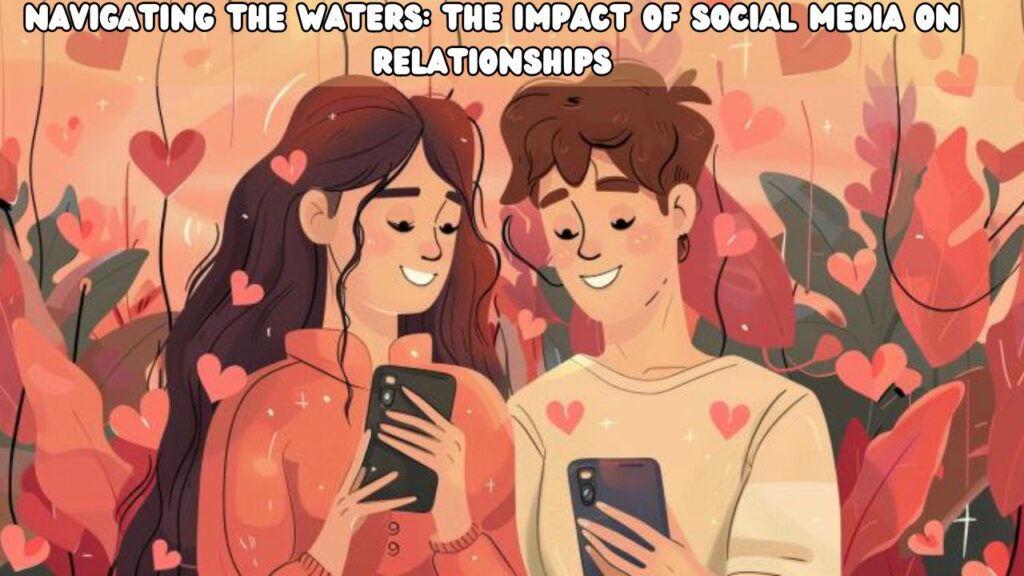As we scroll through our feeds, it’s clear that social media has seamlessly woven itself into the fabric of our daily lives. Its influence on how we interact, share, and perceive relationships is profound, impacting not just our social connections but also our personal well-being. In this exploration, we’ll dissect the nuances of social media’s role in modern relationships, highlighting both its benefits and its pitfalls.
Contextualizing the Rise of Social Media
In the not-so-distant past, the concept of “being online” was a novel idea, relegated to the realms of sci-fi and tech enthusiasts. Fast forward to today, and social media has become as ubiquitous as the air we breathe. It began as a simple means for reconnecting with long-lost classmates and has evolved into a complex web of platforms that influence every aspect of our daily lives—from how we communicate and consume news, to how we form and maintain relationships. The digital landscape now serves as a backdrop to our real-world interactions, creating a new dynamic in personal and professional relationships.
Purpose of the Article
The purpose of this article is to delve deep into the impact of social media on relationships. As an avenue that is often celebrated for its ability to connect us with others, it’s important to recognize that it also poses challenges and risks—particularly when it comes to the intricacies of human relationships. This piece aims to explore both the positive enhancements and the problematic aspects that social media introduces to our interpersonal connections.
What to Expect in the Following Sections
Navigating the nuances of how social media affects relationships requires a comprehensive approach. Therefore, this article will cover several key areas:
- Communication Transformation: Examining how social media has changed the way we communicate, for better and worse.
- Privacy and Boundaries: Understanding the impact of social media on personal privacy and the boundaries within relationships.
- Relationship Standards and Unrealistic Expectations: Looking at how social media can set unrealistic standards and influence relationship satisfaction.
- Social Media’s Role in Building Connections: Exploring the positive aspects of social media in fostering connections and relationships.
- Strategies for Healthy Social Media Use in Relationships: Offering actionable advice on managing social media use to maintain healthy relationships.
Each section will provide insights, backed by research and real-life scenarios, to help you navigate the complexities of social media in your own relationships. Whether you’re deeply embedded in the digital world or just an occasional user, understanding these dynamics is crucial for maintaining healthy interactions in the age of online connectivity.
Communication Transformation

Social media has redefined the scope of how we connect and communicate, weaving digital interactions into the fabric of daily life. This transformation in communication has brought forth new dynamics that reshape personal and professional relationships.
Enhancing Connectivity
How Social Media Keeps Us More Connected
The advent of social media platforms like Facebook, Instagram, and WhatsApp has revolutionized the way we maintain relationships. These platforms offer instant connectivity with a vast network of friends and acquaintances, making it easier than ever to stay in touch. Whether it’s sharing life updates with a wide audience or sending a quick message to a friend across the globe, social media bridges the geographical divide, enabling continuous communication that was not possible before.
Case Studies: Long-Distance Relationships
Consider the example of long-distance relationships, where couples maintain their bond despite physical separations. Social media offers various tools like video calls, real-time messaging, and interactive experiences that help sustain these relationships. Studies show that couples who engage in frequent digital interactions report higher levels of relationship satisfaction compared to those who don’t utilize these tools as effectively.
Personal Anecdote: Reconnecting with Old Friends
From a personal standpoint, I’ve experienced the power of social media first-hand when I reconnected with college friends after nearly a decade. A simple friend request followed by a flurry of messages led to a virtual reunion. This rekindling of old friendships would have been unlikely without the platforms that keep us linked.
Miscommunications and Assumptions
The Downside of Digital Conversations
However, the convenience of digital communication comes with its own set of challenges. The absence of non-verbal cues, such as body language and tone, can lead to misunderstandings. Text-based conversations are particularly prone to being misinterpreted, as the emotional context is often lost in translation.
Example: Texts Versus Face-to-Face Interactions
For instance, a sarcastic remark might be taken seriously or humor could be misconstrued as hostility without the playful tone or facial expressions to give it context. An emoji might help, but it’s hardly a substitute for the rich complexity of face-to-face communication.
Analyzing Common Misunderstandings
Frequent misunderstandings in digital communication can strain relationships, as parties may feel misunderstood or undervalued. Recognizing the limitations of digital interactions is key to mitigating these issues. It involves being mindful of how messages might be perceived and taking the time to clarify when necessary.
Over-dependence on Digital Communication
The Decline of Traditional Communication Skills
The shift towards digital dominance in communication also heralds a decline in traditional communication skills. The art of conversation, including the ability to read social cues, engage in active listening, and express oneself clearly in person, is diminishing, particularly among younger generations raised in a digital-first environment.
Implications for Younger Generations
This shift poses significant challenges for younger individuals, who may find face-to-face interactions more daunting and less comfortable than online chatting. This can affect their social, academic, and eventually professional lives, where in-person communication plays a crucial role.
Strategies to Maintain a Balance
Balancing digital and in-person communication is essential. Encouraging regular face-to-face interactions, whether through family dinners, social outings, or classroom settings, can help maintain and develop interpersonal communication skills. Limiting screen time and prioritizing direct human contact fosters emotional connections that are difficult to replicate online.
While social media significantly enhances connectivity, it also requires us to navigate new communication challenges. By understanding and addressing these issues, we can enjoy the benefits of digital communication while mitigating its downsides.
Privacy and Boundaries

As social media integrates more deeply into our personal lives, the delineation between public and private spaces becomes blurred. This blurring raises significant concerns about privacy and the establishment of healthy boundaries, which are critical for maintaining robust personal relationships.
Navigating Public and Private Spaces
Defining Personal Boundaries Online
Establishing personal boundaries on social media is akin to setting rules for how much of one’s life is shared with the online world. This includes decisions about what types of information are appropriate to post, whom to share with, and what parts of one’s personal life should remain offline. For example, some might choose to share their work accomplishments but keep details of their romantic relationships private.
Risks of Oversharing
Oversharing on social media can lead to several risks ranging from minor embarrassments to serious safety concerns. Personal information, once shared, can be difficult to retract and may be used maliciously. Moreover, oversharing can strain relationships, especially if the shared content includes or implicates others who may have different privacy expectations.
Setting Social Media Boundaries in Relationships
Couples should discuss and agree on what is acceptable to share about their relationship on social media. This includes posts, pictures, and even relationship statuses. Setting these boundaries early on can prevent future conflicts and misunderstandings, and helps maintain respect for each partner’s privacy preferences.
Cyber Stalking and Surveillance
The Dark Side of Accessibility
While social media provides tools for staying connected, it also offers unprecedented access to people’s lives, sometimes leading to cyberstalking or surveillance. These behaviors can escalate from benign curiosity to obsessive monitoring, which can be both invasive and threatening.
Real-Life Scenario: An Unhealthy Obsession Through Social Media
Consider the case of Emily, whose ex-partner used multiple fake social media accounts to monitor her activities online. This digital surveillance escalated to real-life confrontations and required legal intervention. Emily’s experience underscores the potential dangers of unchecked access to personal information through social media.
Tips to Protect Oneself
Protecting oneself from such risks involves using privacy settings effectively, being cautious about accepting friend requests, and being aware of what information one shares online. If harassment occurs, it’s important to document the behavior, block the individual, and report them to the platform and, if necessary, to law enforcement.
Social Media and Jealousy
Stories of Relationships Strained by Online Interactions
Social media can often be a catalyst for jealousy within relationships. Seeing a partner react to or interact with others online can lead to feelings of insecurity and mistrust, even if the interactions are innocent.
Understanding the Triggers
Jealousy often stems from insecurity or fear of comparison. On social media, where only the highlights of someone’s life are typically showcased, it’s easy to feel as though one’s own life—or relationship—doesn’t measure up.
How to Address and Prevent Jealousy
Communication is key in addressing social media-induced jealousy. Discussing feelings openly and setting reasonable social media boundaries can help. It’s also beneficial to reflect on the roots of the jealousy and work on self-esteem issues that may be exacerbated by online interactions. Opting to engage in more real-life activities together can strengthen the relationship and reduce the emphasis on virtual interactions.
Relationship Standards and Unrealistic Expectations

Social media has reshaped our perceptions of relationships through curated and often idealized portrayals. These portrayals can set unrealistic standards, impacting real-world relationship satisfaction and expectations.
The Influence of Idealized Portrayals
Impact of “Perfect” Relationship Posts
Every day, countless social media feeds are inundated with images and stories showcasing perfect moments from seemingly perfect relationships. These posts often only highlight the best times, omitting any strife or struggles that are common to all relationships. This skewed visibility can create a distorted benchmark for what relationships should look like.
Comparison and Dissatisfaction in Real-life Relationships
The constant barrage of these idealized images leads to inevitable comparisons, where one’s own relationship may seem dull or troubled in contrast. This can breed dissatisfaction and a feeling that one’s relationship is inadequate, which may push individuals to either disengage from their relationship or try to stage-manage it to meet these unrealistic standards.
Expert Advice on Dealing with Social Media Pressures
Experts suggest a more mindful consumption of social media content, recognizing that what is depicted is often a partial or rose-tinted view of reality. They recommend focusing on the strengths of your own relationship and discussing feelings of inadequacy with your partner, rather than letting these pressures simmer unaddressed.
The Quest for Social Media Validation
The Role of Likes, Comments, and Shares in Self-Esteem
Social media validation has become a digital currency of self-worth. Many individuals gauge their self-esteem based on the likes, comments, and shares they receive, conflating their value with their online visibility and approval.
Case Study: A Relationship Impacted by Social Media Validation
Consider the case of Sarah and Tom, whose relationship began to sour due to Sarah’s obsession with social media validation. Sarah would become visibly upset if Tom did not ‘like’ or comment on her posts, interpreting his lack of engagement as a lack of affection. Their story highlights how social media can distort personal interactions and expectations.
How to Cultivate Self-Worth Independent of Social Media
Developing a sense of self-worth independent of social media involves engaging in activities that foster genuine self-esteem, such as personal achievements, real-world social interactions, and hobbies. It’s crucial to recognize the intrinsic value of oneself beyond the superficial affirmations on social media.
Coping with Breakups Online
The Digital Footprint of a Past Relationship
In the digital age, relationships leave a significant online footprint—photos, posts, and shared friends. After a breakup, navigating this digital landscape can be a minefield, replete with painful reminders and the potential for obsessive checking of an ex-partner’s activity.
Navigating the Online Presence of an Ex
Managing how to interact with an ex online post-breakup is crucial. It might be necessary to unfollow or even block an ex to heal properly. Such measures are not about animosity but about creating a space where recovery can occur without constant reminders of the past.
Tips for a Healthy Online Breakup Recovery Process
For a healthy recovery process, it’s advisable to take a hiatus from social media post-breakup. This break can help mitigate the pain of constant reminders and reduce the urge to monitor an ex’s online activity. Engaging more with offline activities and in-person relationships can also provide a healthier perspective and emotional support system.
Social Media’s Role in Building Connections

Social media is not just a platform for maintaining existing relationships; it’s also a powerful tool for building new ones. Through shared interests, online dating, and virtual communities, social media can foster meaningful connections in various ways.
Strengthening Ties with Shared Interests
Groups and Forums as Platforms for Connection
Social media platforms host a myriad of groups and forums that bring together individuals with similar interests, passions, or challenges. These virtual spaces provide a forum for discussion, exchange of ideas, and mutual support, making it easier for people to connect on a deeper level despite geographical barriers.
Personal Story: Finding a Community
My personal journey of connecting through social media was through a classic car restoration group. As an enthusiast, finding people with similar interests locally was challenging, but through social media, I connected with a global network of experts and novices alike. This community not only enriched my hobby but also provided emotional support and friendship.
Benefits of Shared Online Activities
Participating in shared online activities can enhance a sense of belonging and community. Whether it’s joining virtual book clubs, gaming together, or collaborating on creative projects, these activities foster a sense of unity and mutual respect among participants.
The Emergence of Online Dating
How Social Media has Transformed Dating
Social media and dating apps have revolutionized the way we meet potential partners. Platforms like Tinder, Bumble, and Hinge have shifted dating from traditional meeting avenues to digital swipes and messages, broadening the dating pool and allowing individuals to connect based on shared interests and values before meeting in person.
Personal Observations: The Pros and Cons of Dating Apps
From a personal perspective, dating apps offer convenience and a plethora of choices that can be both a blessing and a curse. The ease of connecting with many potential partners can be empowering but also overwhelming. It poses the challenge of depth versus breadth—while you can meet more people, forming truly deep connections can be harder.
Safety Tips for Online Dating
Safety in online dating is paramount. Always meet in public places for initial dates, inform a friend or family member about your plans, and trust your instincts. Additionally, use the app’s communication tools rather than sharing personal contact details prematurely.
Creating Opportunities for New Friendships
Success Stories of Friendships Formed Online
There are countless anecdotes of lasting friendships that started online. For instance, people who met through interest-based forums or while playing online games have formed bonds strong enough to lead to real-world meetups and lasting relationships.
Tools and Platforms that Facilitate Connections
Social media platforms like Facebook, LinkedIn, and even specialty forums like Reddit or Discord serve as effective tools for making new connections. These platforms are equipped with features that help users discover others with similar interests, facilitating easier and more meaningful interactions.
Ways to Ensure Authentic and Meaningful Interactions
To foster authentic connections online, it is crucial to be genuine and transparent in your interactions. Avoid the trap of curating an idealized online persona and engage honestly with others. Respectful and meaningful communication encourages stronger and more real connections.
Strategies for Healthy Social Media Use in Relationships

Maintaining healthy relationships in the age of social media requires intentional strategies and practices. These strategies help manage the impact of digital interactions and maintain a balance that fosters genuine and fulfilling personal connections.
Setting Realistic Expectations
Understanding What is Normal in Digital Interaction
It’s crucial to recognize that while digital communication is convenient, it lacks the nuances of face-to-face interactions. Normalizing that not every message will convey perfect emotional tones and not expecting instant responses are important steps in setting healthy digital communication expectations.
Balancing Online and Offline Life
Creating a balance between online interactions and real-life connections is essential. This balance prevents relationships from becoming solely dependent on digital interactions, which can lead to a sense of disconnection despite frequent communication.
Educating on Healthy Relationship Models
Education on what constitutes a healthy relationship in both digital and real-world contexts is vital. This includes understanding privacy, respect, and mutual support. Resources such as counseling or workshops on relationship skills can be incredibly beneficial.
Communication Best Practices
Tips for Clear and Effective Online Communication
To ensure clarity in digital communication, use straightforward language and avoid vague statements that are open to interpretation. Emojis and punctuation can help convey tone but should be used judiciously to enhance understanding rather than confuse.
How to Avoid Misunderstandings
Preventing misunderstandings online can be achieved by regularly checking in with the person on the other end to ensure messages are understood as intended. If a text or message is ambiguous, follow up with a call or video chat to clear up any potential confusion.
Encouraging Open Discussions About Social Media Habits
It’s healthy for relationships to have open discussions about each person’s social media usage and how it might be affecting their connection. Discussing what feels comfortable in terms of sharing, tagging, and online interactions with others can preempt feelings of neglect or jealousy.
Regular Digital Detoxes
The Benefits of Taking Breaks from Social Media
Regular breaks from social media help mitigate its addictive aspects and reduce the stress associated with constant connectivity. Digital detoxes can lead to improved mental health, more satisfying personal relationships, and increased productivity.
Planning Offline Activities Together
To reinforce the bond and enjoy quality time without digital interference, plan regular activities that require personal interaction. This could be as simple as a walk in the park, a board game night, or a cooking session together.
Personal Experience: The Refreshing Effect of Digital Detox
Personally, implementing regular digital detoxes has profoundly impacted my relationships and overall well-being. A weekend without digital devices reinvigorates my outlook, helps me reconnect with loved ones in more meaningful ways, and restores my appreciation for the non-digital aspects of life.
In conclusion, integrating these strategies into daily life can help individuals and couples navigate the complexities of relationships in the digital age more effectively. By setting realistic expectations, practicing effective communication, and incorporating regular digital detoxes, relationships can thrive both online and offline.
Summary of Key Findings

Social media has reshaped virtually every aspect of our interpersonal relationships, influencing how we communicate, set boundaries, and form expectations. While it offers unprecedented opportunities for connectivity, it also introduces complexities that can impact relationships negatively if not managed carefully.
- Communication Transformation: Social media enhances connectivity but also simplifies communication in a way that sometimes strips away the nuanced emotional context, leading to misunderstandings.
- Privacy and Boundaries: The digital era demands a redefinition of privacy. Oversharing can lead to vulnerabilities, while setting digital boundaries protects both individual and relational health.
- Relationship Standards and Unrealistic Expectations: Idealized portrayals on social media can skew expectations, leading to dissatisfaction. Conversely, realistic portrayals and communication can enhance relationship satisfaction.
- Building Connections: Social media can be a powerful tool for building and strengthening relationships through shared interests and online dating, provided users navigate these platforms wisely.
- Healthy Strategies: Balancing online interactions with offline activities and setting clear communication practices can help maintain healthy, fulfilling relationships.
Personal Reflection
Reflecting on the influence of social media on relationships within my own life has underscored the importance of intentional and mindful use of these powerful tools. Navigating the digital landscape with awareness and a clear understanding of both its potential and pitfalls has allowed me to enhance my connections rather than undermine them.
Final Thoughts and Advice
As we continue to integrate social media into our daily lives, the importance of being proactive about its role in our relationships cannot be overstated. Here are a few parting pieces of advice:
- Engage Mindfully: Be thoughtful about what you share and how you interact online. Remember that behind every screen is a person deserving of respect and kindness.
- Communicate Openly: Have open conversations with friends, family, and partners about your social media habits and preferences. Understanding and respecting each other’s boundaries is key.
- Prioritize Real Connections: Make time for face-to-face interactions. These irreplaceable experiences build deeper and more meaningful relationships.
- Digital Detox: Regularly unplugging from social media can help maintain a healthy perspective on its role in your life and relationships.
Embracing these practices will not only safeguard your relationships from potential digital disruptions but also enhance and deepen your connections, both online and offline.
Born in the grit and grind of Detroit, Daniel Firewall's journey has been anything but easy. From an early age, he displayed a knack for understanding systems and breaking codes. His keen analytical mind and relentless pursuit of knowledge led him to become a respected figure in the field of cybersecurity.
Daniel believes in maintaining a balance between the heart and the mind, especially when it comes to online dating. He is fiercely protective of his readers, ensuring they are well-armed with the knowledge and tools they need to navigate the treacherous waters of online dating securely. His mission is simple: ensure everyone can search for love without fearing for their safety.



You may like
Balancing Career and Relationship Goals: A Guide to Harmonious Living
The Impact of Childhood Experiences on Adult Relationships
Setting Boundaries in Romantic Relationships: A Path to Healthy Love